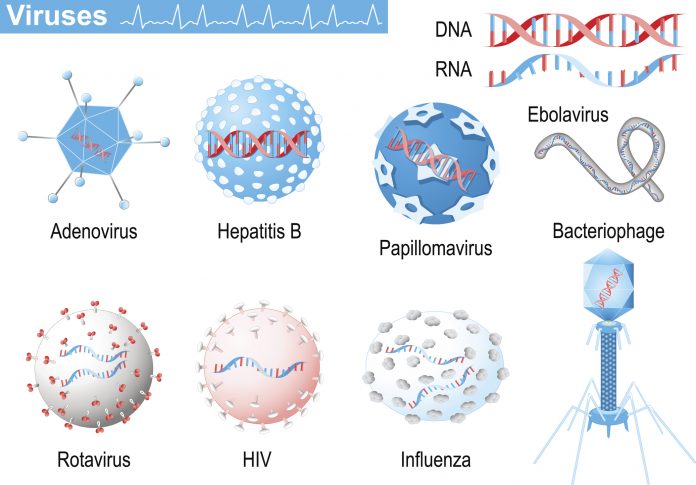Tens of millions of still-unknown or misunderstood viruses can cause diseases – as well as new pandemics – and affect the health of valuable terrestrial and marine environments.
A new pipeline to investigate the ‘virosphere,’ or all the genomes of viruses and bacteriophages (viruses that attack bacteria) of the world has been developed by an international collaboration led by Flinders University.
In the project, described in GigaScience journal, Flinders Accelerator for Microbiome Exploration (FAME) researchers have joined Washington University Professor Scott Handley and colleagues to analyse viruses in human populations – and on coral reefs – to build a robust method of identifying viruses in all animals, plants and environments, and to show the flexibility of the pipeline for future research.
Assisted by FAME directors – microbiologist Professor Robert Edwards and marine microbial biologist Professor Elizabeth Dinsdale – the project ran deep metagenome testing over viruses found in a large UK community collection of faecal samples. Using a large UK database, the study investigated irregularities in the data – including variations in viral genome between different households.
Researchers then tested the tractability of the approach by investigating the range of viral data from a completely different environment – the mucus coatings taken from coral reefs in Bermuda.
“Viruses are by far the most diverse organisms on the planet and yet accurate identification and annotation of viral sequencing is still in its early stages,” says Professor of Bioinformatics and Human Microbiology Edwards.
“This new pipeline seeks to rule out or ‘sacrifice’ thousands of genomic sequences to remove irregularities and find novel viruses that are characteristic of each virome to find a disease ‘signature’.”
The project is named ‘Hecatomb’ after an Ancient Greek tradition of sacrificing or slaughtering animals.
“Now we have a new software platform for viral metagenomics that can find the viruses in the sequence haystack to better understand the actions of these new or existing viruses.”
Dr Scott Handley, Professor of Pathology and Immunology from Washington University’s School of Medicine, says the Hecatomb project provides an opportunity to investigate viruses and bacteriophages associated with diseases like inflammatory bowel diseases.
“I am involved in projects devoted to advancing understanding of how microbial and viral ecology and invasive pathogens operate and impact human health,” says Professor Handley.
“To do this, we needed to produce the hecatomb pipeline to utilise high-throughput sequencing technology, and integrate computational tools enabling viral community analysis.
“We use the hecatomb pipeline to classify and test how alterations in viral community membership and function contribute to disease.”
First author, South Australian bioinformatician Dr Michael Roach, says the project found a number of unique viruses and is a robust starting point to study how viruses may impact or exacerbate common conditions such as irritable bowel disease – or even a way to save coral reefs by reducing the effects of bleaching or pollution.
“From our pipeline of viruses studied in our metagenome samples, we can now look for viral or bacteriophage signatures which explains the disease states, including when the samples vary between households,” says Flinders University academic Dr Roach, who is based at the Adelaide Centre for Epigenetics, at the University of Adelaide.
Meanwhile, Professor Dinsdale says the metagenomes collected from coral protective mucus around reef water in Bermuda – from close to the shore and out in the open ocean – provided another chance to add to the genomic understanding of viruses in healthy marine environments.
“More exact metagenome databases and analysis pipelines are vital to understand the virosphere and preserve species in the face of climate change and biodiversity loss,” says Professor Dinsdale.
“The prevalence of virus infections and microbiome imbalance can affect humans, animals and plant populations alike,” she says.
The article, Hecatomb: an integrated software platform for viral metagenomics (2024) by Michael J Roach, Sarah J Beecroft, Kathie A Mihindukulasuriya, Leran Wang, Anne Paredes, Luis Alberto Chica Cárdenas, Kara Henry-Cocks, Lais Farias Oliveira Lima, Elizabeth A Dinsdale, Robert A Edwards, Scott A Handley has been published in GigaScience https://doi.org/10.1093/gigascience/giae020
Acknowledgements: This research was supported by grants from the US National Institutes of Health (RC2 DK116713 and U01 AI151810) awarded to Prof Edwards and Prof Handley. Dr Roach was supported by Flinders University Impact Seed research grant.











